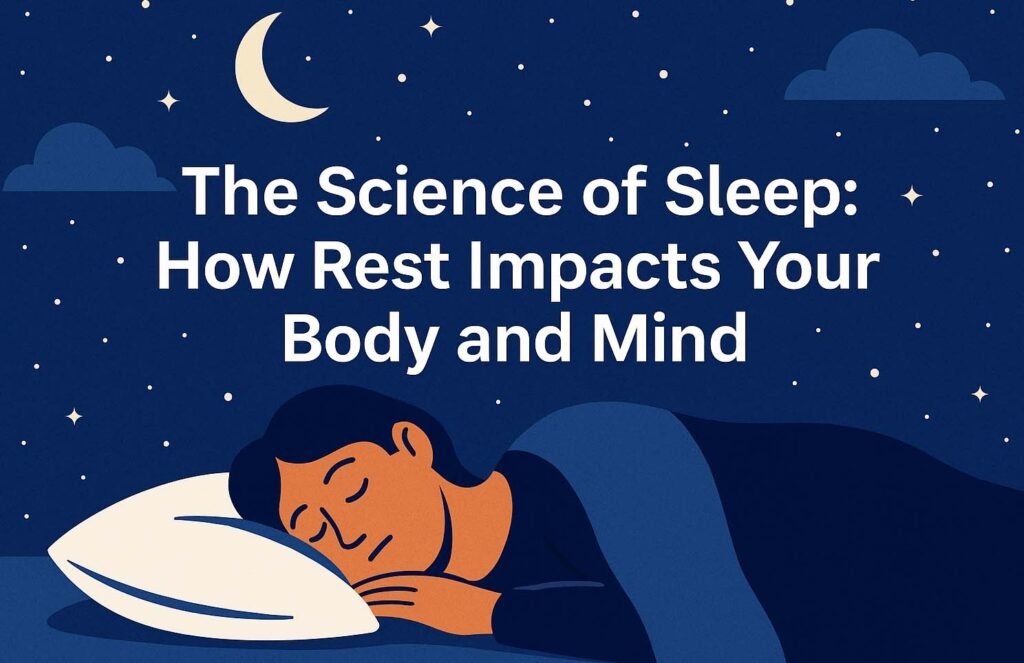
The Science of Sleep: How Rest Impacts Your Body and Mind
In today’s fast-moving world, sleep is often the first thing we give up—whether for work, entertainment, or just trying to keep up with life. According to science, sleep is essential, not a luxury. From repairing cells to storing memories and managing emotions, both your body and mind depend on quality rest.
In this article, we’ll look at what sleep is, what the science says about sleep and its effect on your body, mental sharpness, and emotional well-being.
Why Do We Sleep?
Even after years of research, scientists still have no clear idea why we sleep. But they’ve come up with some really good theories on why it’s important.
Restorative Theory:
Sleep gives time your body and brain to heal. When you are asleep, your brain is relaxing. The pituitary gland releases growth hormones, which play an important role in helping repair muscles and tissues.
Energy Conservation Theory:
Sleep helps your body save energy, especially during the hours when it’s least efficient to do something (like hunt or gather in the dark).
Brain Plasticity Theory:
The widely accepted theory says sleep is essential for learning, memory, and brain development. Your brain can “reset,” strengthen connections, and remove unnecessary ones.
Understanding Sleep Cycles
Sleep isn’t one long, steady state—it moves in cycles that repeat about every 90 minutes. These cycles are made up of two main types: non-REM (NREM) and REM (rapid eye movement) sleep.
NREM Sleep:
- Stage 1: This sleep is the lightest of all, if you ‘re only drifting off.
- Stage 2: your heart rate slows down and your body temperature falls
- Stage 3: This is deep sleep or “slow-wave sleep.” It’s when your body focuses on physical healing and immune support.
REM Sleep:
REM sleep usually kicks in about 90 minutes after you’ve fallen asleep. Your brain is highly active, and this is when most dreaming takes place. REM stimulates learning, memory storage, and helps manage your mood.
As the night goes on, you spend more time in REM sleep. That’s why the last couple of hours of sleep are so important for your mental and emotional balance.
The Physical Benefits of Sleep
- Repairing Your Body
During deep sleep, your body works on healing muscles, tissues, and cells. A 2012 study in Frontiers in Neurology found that this stage of sleep helps regulate hormones and boosts immune health. - Boosting Your Immune System
Research in Nature Reviews Immunology shows that sleep strengthens your immune memory—helping your body better respond to infections. On the flip side, not getting enough sleep might reduce protective proteins and cause inflammation. - Protecting Your Heart
Sleep helps keep your blood pressure, cholesterol, and heart rate in check. According to the American Heart Association, a sleep duration of less than 6 hours a night can increase the risk of heart disease, stroke, and high blood pressure.
The Mental and Emotional Benefits of Sleep
- Helping You Learn and Remember
sleep help storage of memories in the short term and long term . A 2007 paper in Science explained how your brain replays the day’s events during sleep to cement what you’ve learned. - Managing Emotions
Lack of sleep causes the part of the brain that manages emotions – the amygdala – to become excited. A study from UC Berkeley found that lack of sleep makes the amygdala up to 60% more reactive, which can lead to mood swings, stress, and anxiety. - Supporting Mental Health
There’s a close link between sleep and mental health issues. This includes depression, anxiety, and bipolar disorder—all of which tend to co-exist with sleep problems. In fact, an article in JAMA Psychiatry found that people with chronic insomnia are twice as likely to develop depression.
The Downside of Not Getting Enough Sleep
Skipping even one night of sleep can make you groggy, clumsy, and forgetful. But when sleep deprivation becomes a habit, the effects get more serious.
- Cognitive Decline
Long-term sleep loss can speed up brain aging and increase your risk of conditions like Alzheimer’s. According to the NIH, sleep helps your brain clear out harmful debris like beta-amyloid—one of the proteins linked to Alzheimer’s. - Weight Gain and Diabetes Risk
Lack of sleep messes with hunger hormones. It raises ghrelin (which makes you hungry) and lowers leptin (which makes you feel full). A study in PLOS Medicine pointed out that sleep-deprived people tend to consume more calories and are more likely to be obese and develop type 2 diabetes. - Poor Judgment
The prefrontal cortex—your brain’s decision-making center—is highly sensitive to sleep loss. That’s why you’re more likely to take risks, be impulsive, or make poor decisions when you’re tired.
How Much Sleep Do You Need?
Your sleep needs depend on your age:
- Adults (18–64): 7–9 hours
- Older adults (65+): 7–8 hours
- Teenagers: 8–10 hours
- Children and infants: 9–14 hours (varies by age)
But it’s not just about how long you sleep—how well you sleep matters just as much. Light, broken sleep can be just as harmful as getting too little.
Simple Tips for Better Sleep
- Stick to a schedule: Get up and go to sleep at the same time every day, even on weekends.
- Reduce screen time before bed: Blue light from phones and computers affects melatonin, your sleep hormone.
- Create a calming routine: Reading or meditating before bed can help.
- Avoid caffeine and alcohol at night: They interfere with your ability to fall and stay asleep.
- Set up your space: For best rest, try to keep your bedroom dark, quiet, and cool.
When to Talk to a Doctor
If you constantly struggle with falling asleep, wake up multiple times during the night, or feel tired all day despite getting enough sleep, consult with your doctor. You may have something like sleep apnea, restless leg syndrome, or narcolepsy—all of which need medical attention.
Final Thoughts
Sleep is so much more than “down time.” It’s an active, healing process involving almost every part of your body and brain. Lack of sleep can harm your health, mood, memory, and focus.
But here’s the good news: sleep is one of the easiest things you can control to feel better. Whether you’re a student, a busy parent, or a night-shift worker—getting better sleep can really improve your life.
References
- Irwin, M.R. (2015). “Why sleep is important for health: A psychoneuroimmunology perspective.” Annual Review of Psychology
- Xie, L. et al. (2013). “Sleep drives metabolite clearance from the adult brain.” Science
- Krause, A.J. et al. (2017). “The sleep-deprived human brain.” Nature Reviews Neuroscience
